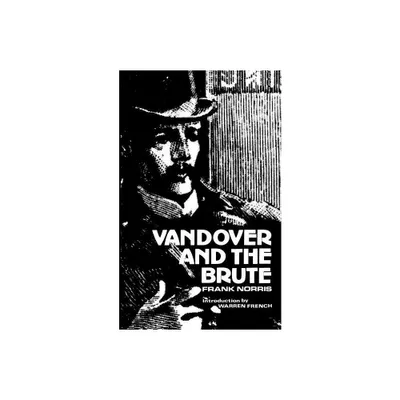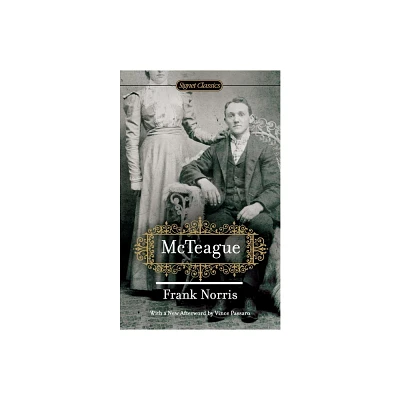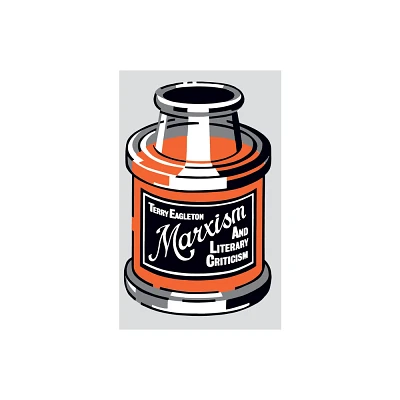Home
The Literary Criticism of Frank Norris
Loading Inventory...
Barnes and Noble
The Literary Criticism of Frank Norris
Current price: $24.95


Barnes and Noble
The Literary Criticism of Frank Norris
Current price: $24.95
Loading Inventory...
Size: Paperback
*Product Information may vary - to confirm product availability, pricing, and additional information please contact Barnes and Noble
All of American author Frank Norris’s significant critical writings have been compiled in this book, including his articles for the
San Francisco Wave
during 1896-1897 and selections from his “Weekly Letter” column for the
Chicago American
in 1901. Essays from these two previously unexploited sources, comprising almost half the book, reveal certain areas of Norris’s thought which heretofore had been overlooked by scholars.
This book was compiled in order to clarify Frank Norris’s literary creed. When Donald Pizer began to read Norris’s uncollected critical articles, he observed concepts which had been unnoted or misunderstood by his critics. Crediting this to the inadequate representation of Norris’s ideas in the posthumous
The Responsibilities of the Novelist
(1903), Pizer recognized the need for an interpretive and complete edition of Norris’s critical writings. This volume thus fills a noticeable gap in the field of American literary criticism.
By the time of his death in 1902 Norris had a closed system of critical ideas. This core of ideas, however, is only peripherally related to the conventional concept of literary naturalism, which perhaps explains why critics have gone astray trying to find Zolaesque ideas in Norris’s criticism. Norris’s central idea, around which he built an aesthetic of the novel, was that the best novel combines an intensely primitivistic subject matter and theme with a highly sophisticated form. His paradox of sophisticated primitivism clarifies the vital link between the fiction produced in the 1890s and that written by Hemingway, Faulkner, and Steinbeck.
Norris’s essays deal with many of the literary themes which preoccupy modern critical theorists. His range of subjects includes the form and function of the novel; definitions of naturalism, realism, and romanticism; and the problem of what constitutes an American novel. His interpretation of commonplace events, his comments on prominent figures of his day, and his parodies of writers such as Bret Harte, Stephen Crane, and Rudyard Kipling are characterized by ingenuity and perception. Through these writings the personality of a man with well-defined convictions and the ability to expound them provocatively comes into sharp focus.
In a general introduction Pizer summarizes Norris’s critical position and surveys his career as literary critic. This introduction and the interpretative introductions preceding each section constitute an illuminating essay on the literary temper of the period and provide a new insight into Norris’ craft and his literary philosophy.
San Francisco Wave
during 1896-1897 and selections from his “Weekly Letter” column for the
Chicago American
in 1901. Essays from these two previously unexploited sources, comprising almost half the book, reveal certain areas of Norris’s thought which heretofore had been overlooked by scholars.
This book was compiled in order to clarify Frank Norris’s literary creed. When Donald Pizer began to read Norris’s uncollected critical articles, he observed concepts which had been unnoted or misunderstood by his critics. Crediting this to the inadequate representation of Norris’s ideas in the posthumous
The Responsibilities of the Novelist
(1903), Pizer recognized the need for an interpretive and complete edition of Norris’s critical writings. This volume thus fills a noticeable gap in the field of American literary criticism.
By the time of his death in 1902 Norris had a closed system of critical ideas. This core of ideas, however, is only peripherally related to the conventional concept of literary naturalism, which perhaps explains why critics have gone astray trying to find Zolaesque ideas in Norris’s criticism. Norris’s central idea, around which he built an aesthetic of the novel, was that the best novel combines an intensely primitivistic subject matter and theme with a highly sophisticated form. His paradox of sophisticated primitivism clarifies the vital link between the fiction produced in the 1890s and that written by Hemingway, Faulkner, and Steinbeck.
Norris’s essays deal with many of the literary themes which preoccupy modern critical theorists. His range of subjects includes the form and function of the novel; definitions of naturalism, realism, and romanticism; and the problem of what constitutes an American novel. His interpretation of commonplace events, his comments on prominent figures of his day, and his parodies of writers such as Bret Harte, Stephen Crane, and Rudyard Kipling are characterized by ingenuity and perception. Through these writings the personality of a man with well-defined convictions and the ability to expound them provocatively comes into sharp focus.
In a general introduction Pizer summarizes Norris’s critical position and surveys his career as literary critic. This introduction and the interpretative introductions preceding each section constitute an illuminating essay on the literary temper of the period and provide a new insight into Norris’ craft and his literary philosophy.


















